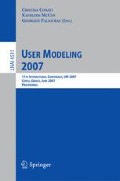Abstract
The interpretation of physiological signals in terms of emotion requires an appropriate mapping between physiological features and emotion representations. We present a user model associating psychological and physiological representation of emotion in order to bring findings from the psychophysiology domain into User-Modeling computational techniques. We discuss results based on an experiment we performed based on bio-sensors to get physiological measure of emotion, involving 40 subjects.
Access this chapter
Tax calculation will be finalised at checkout
Purchases are for personal use only
Preview
Unable to display preview. Download preview PDF.
References
Picard, R., Healey, J., Vyzas, E.: Toward machine emotional intelligence, analysis of affective physiological signals. IEEE transactions on pattern analysis and machine intelligence, 23(10) (2001)
Lisetti, C.L., Nasoz, F.: Using noninvasive wearable computers to recognize human emotions from physiological signals. EURASIP Journal on Applied Signal Processing 11, 1672–1687 (2004)
Kim, K.H., Bang, S.W., Kim, S.R.: Emotion recognition system using short-term monitoring of physiological signals. Medical & Biological Engineering & Computing, 42 (2004)
Conati, C., Chabbal, R., Maclaren, H.: A study on using biometric sensors for monitoring user emotions in education games. In: Brusilovsky, P., Corbett, A.T., de Rosis, F. (eds.) UM 2003. LNCS, vol. 2702, Springer, Heidelberg (2003)
Peter, C., Herbon, A.: Emotion representation and physiology assignments in digital systems. Interacting with Computers 18(2), 139–170 (2006)
Fiorito, E., Simons, R.: Emotional imagery and physical anhedonia. Psychophysiology 31, 513–521 (1994)
Villon, O., Lisetti, C.: Toward building adaptive user’s psycho-physiological maps of emotions using bio-sensors. In: Workshop on Emotion and Computing, KI ( 2006)
Lang, P., Bradley, M., Cuthbert, B.: International affective picture system (iaps): Digitized photographs, instruction manual and affective ratings. Technical report A-6. University of Florida (2005)
Rottenberg, J., Ray, R., Gross, J.: Emotion elicitation using films. In: Coan, J., Allen, J. (eds.) The handbook of emotion elicitation and assessment, Oxford University Press, New York (2006)
Russell, J.A.: A circumplex model of affect. Journal of Personality and Social Psychology 39(6), 1161–1178 (1980)
Author information
Authors and Affiliations
Editor information
Rights and permissions
Copyright information
© 2007 Springer-Verlag Berlin Heidelberg
About this paper
Cite this paper
Villon, O., Lisetti, C. (2007). A User Model of Psycho-physiological Measure of Emotion. In: Conati, C., McCoy, K., Paliouras, G. (eds) User Modeling 2007. UM 2007. Lecture Notes in Computer Science(), vol 4511. Springer, Berlin, Heidelberg. https://doi.org/10.1007/978-3-540-73078-1_37
Download citation
DOI: https://doi.org/10.1007/978-3-540-73078-1_37
Publisher Name: Springer, Berlin, Heidelberg
Print ISBN: 978-3-540-73077-4
Online ISBN: 978-3-540-73078-1
eBook Packages: Computer ScienceComputer Science (R0)

